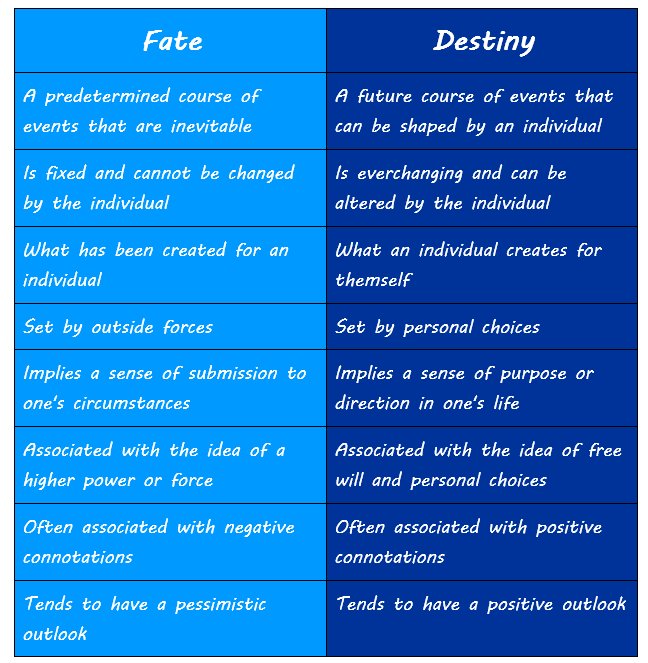Destiny and fate may seem interchangeable, yet they hold distinct meanings. Destiny is what you create through your choices and actions, influenced by your beliefs and values. Fate, on the other hand, implies a predetermined course of events beyond your control. Understanding what is the difference between destiny and fate can empower you to navigate life’s uncertainties with a newfound clarity. Delve deeper to uncover the nuances that shape your path and shape your future.
What is the Difference Between Destiny and Fate?
Welcome to our exploration into the intriguing concepts of destiny and fate! Have you ever wondered if your life is guided by a predetermined plan or if everything is just a series of random events? In this blog post, we will delve deep into the distinctions between destiny and fate to shed light on these often-misunderstood terms.
Defining Destiny and Fate
Let’s start by defining what destiny and fate mean. Destiny is the idea that your future is predetermined, usually associated with a positive outcome or a specific purpose in life. On the other hand, fate is often seen as a force beyond human control that determines events. While the two terms are used interchangeably in everyday conversations, they carry distinct meanings in philosophical and literary contexts.
The Concept of Destiny
Destiny is like a map that guides your life’s journey. It’s the belief that certain events are meant to happen to you, leading you towards a particular path or goal. Many people find comfort in the idea that there is a greater plan for their lives, ensuring that everything happens for a reason.
For example, imagine you dream of becoming a famous artist. Your belief in destiny might lead you to think that no matter what challenges come your way, you will ultimately achieve your goal because it is your destiny.
The Notion of Fate
In contrast, fate is often viewed as an external force that shapes the course of events, regardless of individual choices or actions. It’s like being caught in a stream, unable to change the direction in which you are heading. Fate is frequently associated with a sense of inevitability and sometimes even a feeling of resignation.
Consider a scenario where you miss your bus and think it’s just bad luck. You might attribute this event to fate, believing that no matter what you did, you were meant to miss that bus. This acceptance of events beyond your control is a hallmark of the concept of fate.
Exploring the Key Differences
Agency and Control
One of the fundamental distinctions between destiny and fate lies in the degree of agency and control they afford individuals. Destiny implies that you have a role to play in shaping your future, even if the overall outcome is predetermined. It suggests that your actions and decisions contribute to fulfilling your ultimate purpose.
On the other hand, fate often conveys a sense of powerlessness, as if events are preordained and beyond your influence. While destiny suggests a partnership between you and a higher plan, fate can feel more like a solitary journey where external forces dictate the course of your life.
Optimism vs. Fatalism
Another crucial difference between destiny and fate is the emotional tone they evoke. Destiny is often associated with hope, optimism, and a belief in a brighter future. It instills confidence that no matter what obstacles you face, you are destined to overcome them and achieve your goals.
Conversely, fate can evoke feelings of fatalism, resignation, or even despair. The idea that events are predetermined can lead to a sense of inevitability, where one might feel powerless to change their circumstances. This lack of agency can be disheartening for those who believe in a strict interpretation of fate.
How to Navigate Destiny and Fate in Your Life
Now that we’ve explored the key disparities between destiny and fate, you might be wondering how to navigate these concepts in your own life. Here are some tips to help you embrace the positive aspects of destiny while mitigating the potential pitfalls of fate:
Embrace Destiny with Purpose
If you believe in destiny, use it as a source of motivation and purpose. Rather than waiting for things to happen, take an active role in shaping your future. Set goals, pursue your passions, and trust that your efforts will align with your destined path.
Challenge Fatalism with Resilience
If you feel trapped by a sense of fatalism, remember that you still have the power to respond to challenges with resilience and determination. While some events may be beyond your control, your reactions and choices can shape how you navigate through life’s twists and turns.
In conclusion, destiny and fate are complex concepts that have fascinated humanity for centuries. While they share similarities in terms of predetermination, agency, and emotional impact, they offer distinct perspectives on the nature of human existence. Whether you believe in destiny, fate, or a combination of both, what’s essential is how you choose to interpret and respond to the events unfolding in your life.
By understanding the nuances of destiny and fate, you can cultivate a sense of purpose, agency, and resilience that empowers you to navigate life’s uncertainties with grace and determination. So, embrace your destiny, challenge your fate, and remember that ultimately, the choices you make shape the story of your life.
🔵 Fate vs Destiny Meaning – Destiny or Fate Definition – Destiny and Fate Examples – Difference
Frequently Asked Questions
What distinguishes destiny from fate?
Destiny is often considered as a predetermined course of events that is inevitable and cannot be changed, while fate is seen as the result of choices and actions that lead to certain outcomes. Destiny implies a sense of finality or purpose, while fate suggests a combination of circumstances and personal decisions.
Can destiny and fate be altered?
Destiny is often viewed as unchangeable, as it is believed to be guided by a higher power or a preordained plan. In contrast, fate is seen as more malleable and can be influenced by personal choices, actions, and external factors. While destiny may be seen as a fixed path, fate allows for some degree of agency and free will.
How do destiny and fate impact our lives?
Destiny is often associated with a sense of purpose or a greater meaning to events in our lives. It can provide comfort and guidance in times of uncertainty. Fate, on the other hand, emphasizes the role of personal responsibility and the consequences of our decisions. Understanding the difference between destiny and fate can help individuals navigate challenges and opportunities with a greater sense of clarity and awareness.
Final Thoughts
Destiny and fate are often used interchangeably, but they hold distinct meanings. Destiny refers to a predetermined course of events, influenced by personal choices. Fate, on the other hand, implies a fixed outcome beyond individual control. Understanding the subtle disparity between destiny and fate can empower individuals to shape their future. So, remember, destiny is what you create through your actions, while fate is what is predetermined for you. Understanding this difference can lead to a more proactive approach in navigating life’s journey.
 home depot coupons moving helping customers save on essential home supplies
home depot coupons moving helping customers save on essential home supplies 
